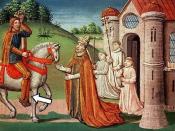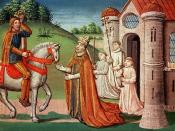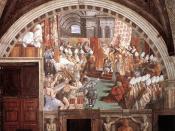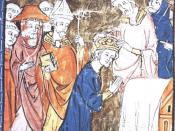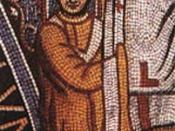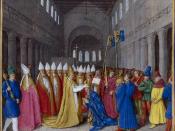Charles the Great, or Charlemagne was king of the Franks, the Lombards, and emperor in the West. Charlemagne was an individual who loved all his people and wanted everyone to be loyal to God. Charlemagne provided a strong sense of responsibility for the land in which he overlooked. He was a man of great character and military command. Charlemagne was born in c. 742 as the eldest son of Pepin. He was a very large man standing at six feet, three and half inches tall.1 During his lifetime, he preached greatly about one's understanding of the Christian principles and how the religion tied in with the church. Charlemagne felt the church was a place to ease your mind frame. Praying at the church would help you understand how you really are. It lets you touch the spiritual side of your mind. He was a strong believer in the church and wanted his people to have the utmost respect for the church.
If one disobeys the church, they would be punished according to there crime. Charlemagne would go and pray everyday at the cathedral he built in Aachen. He would go every morning and night with great regularity. He thought of the church he built as a very sacred place. In this essay, I will examine how his strong attitudes for the church could be seen in his issues with warfare, his relationship with the Pope, and education using Andrea, Two lives of Charlemagne, and Hollister as my sources.
Charlemagne's dealings with warfare were very serious. He was a fearless warrior who always wanted to win and would do whatever it takes to make sure it happened. Most of the time, when he is preparing to go to battle, it was not whether they were going to fight for sure, but whom they would be fighting.2 He would take on any challengers from anywhere. For example, when Hunold had attempted to take over the Aquitaine and restart a battle that was almost over, Charlemagne crossed the River Garonne and sent a messenger to Lupus, and ordered him to surrender the fugitive.3 Lupus made a wise decision by surrendering Hunold. This example shows how Herculean of a warrior he was and the power he possessed. Another example of his great Herculean efforts is his war against the Saxons. The Saxons were individuals from Germany. Saxons were people who did not like the Christian religion. War was waged against the Saxons and Charlemagne took charge quickly. Many people had surrendered to Charlemagne and some would even reduce to abandoning the worship of the devil and willingly follow the Christian faith.4 Charlemagne only waged in battle against the Saxons twice and both times, the enemy was severely beaten and vowed that they would never attack the king again.5 This example of his war against the Saxons shows the great leadership skills he possessed and the love he had for the Christian religion. The tactics that Charlemagne used against the Saxons were very adverse. Not at anytime did he allow anyone who offended his leadership to go unpunished. He took vengeance on the individual and gave them a fitting punishment.6 He punished them by means of his army (who would fight every summer in a new region), which he would lead, or he would let out a force that would punish the culprit under his command.7 After all those that disobeyed resistance were taken care of, they would be taken to a place said by Charlemagne.8 In his fight against the Muslims, he shows more of his phenomenal tactics in warfare. Roland, who is Charlemagne's nephew, is in charge of the emperor's rear guard.9 Ganelon, who enters a conspiracy with the Muslim king, is going to ambush him.10 Ganelon thinks Roland will not sound the horn for reinforcements and Roland ends up not sounding the horn until 20,000 Christian soldiers lied died.11 Emperor Charlemagne returns to try to prevent his nephew's death but he manages to destroy all the Muslim forces in Spain and torture Ganelon to death.12 This example shows his love for the Christian religion. He would not let his fellow followers be put to death with retribution. By killing Ganelon, he earns the full vengeance of all the Christians who died. He wanted his people to be physically powerful and fight for what they believed in. All his fighters were mostly Christians and loved the church. He believed that if you were for the Christian religion, then you would die for the Christian religion. He saw the church as a place where one could pray to be forgiving for the sins he committed. He wanted individuals to realize how important warfare is.
Charlemagne's relationship with the pope was very excellent. He had good ties with Pope Hadrian. They got along very well and he was like a brother to him. When Hadrian had passed away, Charlemagne wept very much and was very saddened by the lost. After his death, the pope that succeeded him was Pope Leo III. Pope Leo was accused of terrible crimes and many people of Rome wanted to bring his reign to an end. In Charles the Greats, LETTERS Charlemagne states to Pope Leo III "that, on the one hand, you shall pray for me and give me the apostolic benediction, and that, on the other, with the aid of God I will ever defend the most holy seat of the holy Roman Church.13 Another example of his love for the church is when he says "If any one shall have entered a church by violence and shall have carried off anything in it by force or theft, or shall have burned the church itself, let him be punished to death.14 Both of these examples state how critical of an attitude Charlemagne had for the church. He would defend the holy Church of Christ to any extent. Also, when Pope Leo III asks Charlemagne to come to Rome, he does not know what it is for but he comes instantly to his command. When he arrives, Pope Leo III unwontedly bestows him for a dignity. He is given the title of "emperor". Einhard reported that if Charlemagne knew what was going to be going on, he would never have stepped foot in the church. This was not the way he wanted to be crowned, but he showed respect to the Pope for what he did. He did not get mad at him because he is a high authority. The Pope felt he deserved to be emperor. This shows the loyalty Charlemagne had to the church and also to the Pope. Also, when Charlemagne sets up the missi dominici, this shows his care for the church and the pope. He wanted to make sure that everything was being run well in certain counties especially concerning local churches and how they were run. These individuals went around and examined the assigned areas, corrected any minor damages, and reported anything big out of the ordinary.15 This helped the Pope in that it helped him control what went on in certain areas better. Also, the Capitulary on Saxony helped keep the church in order and keep peace among members. It had lots of regulations that helped keep the church in order. For example, one commandment says, "If any one shall have formed a conspiracy with the pagans against the Christians, or shall have wished to join with them in opposition to the Christians, let him be punished by death; and whosever shall have consented fraudulently to this same against the king and the Christian people, let him be punished by death.16 This obligation or law shows how much the church meant to him and how much the religion of Christianity meant to him. Another example of his loyalty to the church and to the lord is when he says, "If any one shall have shown himself unfaithful to the lord king, let him be punished with a capital sentence."17 Charlemagne's desire to see the church succeed and his loyalty to the Pope can be seen in this example. Charlemagne is willing to sacrifice his body against all enemies in order to keep the church in happiness. He has always wanted to be in power and have full responsibility for the church. Charlemagne loves the church and wants to preserve the Holy Christ of the church to any extreme. By having good relationships with the Pope, Charlemagne is showing the great devotion he had for the church.
Charlemagne also valued education greatly. He felt that having a good education was important for success. While young, he went through lots of schooling and became a very intelligent man. He prepared his sons and daughters greatly for school. He also felt the same way about the people who ran the church. The abbots and bishops needed to have a good education in order to help the church maintain high standards. Without the abbots and bishops having a good education, they could not keep the church in good health, and help promote the religion of Christianity to the church. In the Capitulary on the Missi, he tells of how bishops and abbots should present themselves. He wanted people to be loyal to these well-educated men. If one would do wrong in from of them, they then would be punished. He believed the bishops had special responsibility for the church. Education was a big thing to him when it came to the church. Without a legitimate person with an adequate education running the church, the church would have major problems.
In conclusion, Charlemagne had a strong tie in with the church. Charlemagne's strong desire for warfare, his relationships with the pope, and his value for education showed how much he loved the church and what it meant to him. He is someone who valued the church very much and tried to do what he could for it. He wanted to make sure that it was always under good leadership and operating sufficiently. Charlemagne always tried to promote the Christian religion into the church because he felt the religion had a lot of good ideas to offer. Charlemagne's love for the church and his strong dedication to see it flourish into a Christian atmosphere showed how great of a ruler he was during his time.
